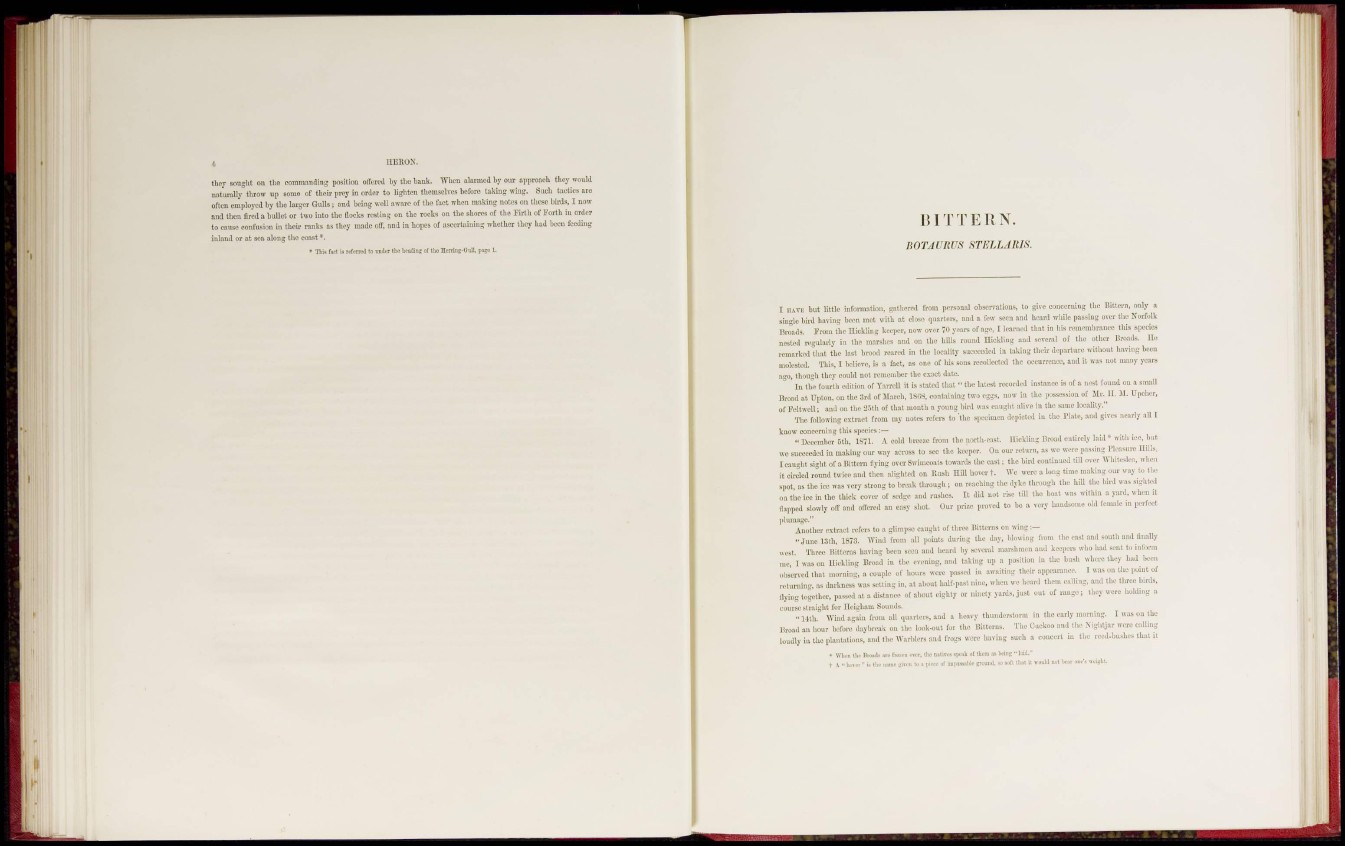
HERON.
they sought on the commanding position offered by tho hank. When alarmed by our approach they would
naturally" throw up some of their prey in order to lighten themselves before taking wing. Such tactics are
often employed by tho larger Gulls; and being well aware of tho fact when making notes on these birds, I now
and then fired a bullet or two into the docks resting on tho rocks on the shores of the Firth of Forth in order
to cause confusion in their ranks as they made off, and in hopes of ascertaining whether they had been feeding
inland or at sea along the coast ".
BITTERN.
BOTJURUS STELLJRIS.
I HAVE hut little information, gathered from personal observations, to give concerning tin- Bittern, only a
single bird having been met with at CJOM quarters, and a few seen and heard while passing over the Norfolk
Broads. From the Iliekling keeper, now over "I) years of age, I learned that in his remembrance this species
nested regularly in the marshes and on the hills round Iliekling and several of the other Broads. He
remarked that the last brood reared in the locality succeeded in taking their departure without having been
molested. This, I ltelievc, is a fact, as one of Ids sons recollected the occurrence, and it was not many years
ago, though they could not remember the exact date.
In the fourth edition of Yarrell it is stated that " the latest recorded instance is of a nest Found on a small
Kroad at Upton, cm the ;lrd of March, IStiS, containing two eggs, now- in the possession of Mr. II. M. Bpcher,
of Fellwelt; and on the 2.1th of that month a young bird was caught alive in the same locality."
The following extract from my notes refers to the specimen depleted in the Plate, and gives nearly all I
know concerning this >|nri,s : —
" December Clh, 1871. A cold breeze from the north-east. Iliekling BROOD entirely laid* with ice, hat,
we succeeded in making our way across to see the keeper. On our return, as we were passing Pleasure Hills.,
Icaught sight of aBitteru flying overSwimeoats towards the east : the bin! continued till orer White-lea, when
it circled round twice and then alighted on Hash Tlill hover +. We were a long time making our nay to 1 be
spot, as the ice was very strong to break through ; on reaching the dyke through the hill the bird was sighted
on the ice in the thick cover of sedge and rushes. It did not rise till the boat was within a yard, when it
•lapped slowly off and offered an easy shot. Our prize proved to l>o a very handsome old female in perfect
Another extract refers to a glimpse caught of three Bitterns on wing:—
"June 13th, 1S73. Wind from all points during the day, blowing from the cast and south and finally
west. Three Bitterns having been seen and heard by several marshnieu anil keepers who had sent to inform
me, I was on Iliekling Broad in the evening, and taking up a position in the bush where they had bora
observed that morning, a couple of hours were passed in awaiting their appearance. [ was on the point of
returning, as darkness was setting in, at atiout half-past nine, when we heard them calling, and the three birds,
dying together, passed at a distance of about eighty or ninety yards, just out of range; they were holding a
course si might for llcigbaui Sounds.
" 14th. Wind again from all quarters, and a heavy thunderstorm in the early morning. I was ou the
Uroad an hour before daybreak on the look-out for the Bitterns. The Cuckoo and the ,\ ighljar wire calling
loudly iu the plantations, and the Warblers and frogs wen' having such a concert in the reed-hushes that il
• When tln< Hiimds ire froim om, tho rulm* ipeak of them in Wwg ••hid."